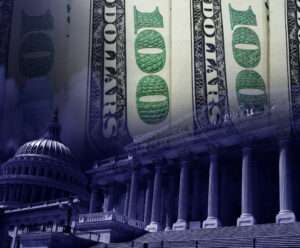The Volokh Conspiracy
Mostly law professors | Sometimes contrarian | Often libertarian | Always independent
Immigration Could Reduce the Deficit by at Least $1 Trillion Over the Next Ten Years
But the Congressional Budget Office projection assumes we will not cut immigration levels, as is likely to happen if Trump returns to power.

One standard rationale for immigration restrictions is the idea that immigrants overburden the welfare state, thereby increasing fiscal burdens on natives. In reality, just the opposite is true. Immigration actually reduces those burdens, on net. A new Congressional Budget Office (CBO) report estimates that immigration will reduce the federal budget deficit by some $1 trillion over the next ten years. Reason's Eric Boehm summarizes the implications:
Higher levels of immigration are boosting America's economy and will reduce the deficit by about $1 trillion over the next decade.
In its semi-annual forecast of the country's fiscal and economic conditions, released this week, the Congressional Budget Office slightly lowered its expectations for this year's federal budget deficit. The CBO now expects the federal government to run a $1.5 trillion deficit, down from the $1.6 trillion deficit previously forecast.
That reduction is due in part to higher-than-expected economic growth, which the CBO attributes to "more people working." The labor force has grown by 5.2 million people in the past year, "mostly because of higher net immigration."
More immigrants will also help reduce future budget deficits—which are expected to average $2 trillion annually over the next 10 years, meaning any help is desperately needed.
The changes in the labor force over the past year will translate into $7 trillion in greater economic output over the next decade, the CBO estimates, "and revenues will be greater by about $1 trillion than they would have been otherwise…."
"The higher growth rate of potential GDP over the next five years stems mainly from rapid growth in the labor force, reflecting a surge in the rate of net immigration," concludes the CBO, which expects higher than normal levels of immigration through at least 2026.
Of course, this isn't exactly rocket science. More workers equals more economic output and more growth, which in turn leads to more tax revenue to help offset some of the federal government's seemingly insatiable appetite for spending. Sometimes economics can be quite confusing, but that formula is about as straightforward as can be.
America's current population is trending older, which strains old-age entitlement programs and means fewer productive workers in the economy. Thankfully, that's not true of the country's immigrants: "A large proportion of recent and projected immigrants are expected to be 25 to 54 years old—adults in their prime working years…"
It also tracks with what other studies have repeatedly shown: More legal immigration grows the economy, helps fund government programs, and doesn't strain entitlement or welfare programs.
As Boehm notes, CBO likely underestimates the beneficial fiscal effects of immigration, because the agency is not allowed to use "dynamic" scoring to assess them. In addition, CBO does not consider immigrants' disproportionate contributions to entrepreneurship, innovation, and scientific research, all of which further boost economic growth and productivity, and thereby also improve the government's fiscal position.
There is, however, one important caveat to CBO's otherwise optimistic assessment: it assumes immigration will remain roughly at current or even higher levels at least through 2026. That's unlikely to happen if Donald Trump returns to power and carries out his plans to drastically reduce immigration - including the legal kind. During his previous term, Trump cut legal immigration in half. He actually had much more success on that front than when it comes to the illegal kind. In a second term, Trump would likely go even farther. The predictable result will be lower economic growth, less entrepreneurship and innovation, and significantly higher deficits.
Biden's presidency has been a mixed bag, at best. His fiscal record is highly problematic. But one of his most important achievements was returning immigration to pre-Trump/pre-pandemic levels. If Trump returns to power, he would likely reverse that.
Obviously, fiscal effects are not the only possible justifications for cutting immigration. Restrictionists can still argue for reducing it on the grounds that immigrants increase crime, damage political institutions, make bad decisions at the ballot box after they become voters, spread harmful cultural values, and so on. If such harms are great enough, they could outweigh even very large beneficial fiscal effects. I address these and other rationales for restrictionism in detail in Chapters 5 and 6 of my book Free to Move: Foot Voting, Migration, and Political Freedom.
But supposedly adverse fiscal effects are still a significant restrictionist talking point, especially among those who consider themselves libertarians or fiscal conservatives. The CBO report adds to the already extensive evidence showing that such concerns are not only misplaced, but counterproductive. Far from increasing the fiscal burden on natives, immigration actually reduces it.


Show Comments (105)